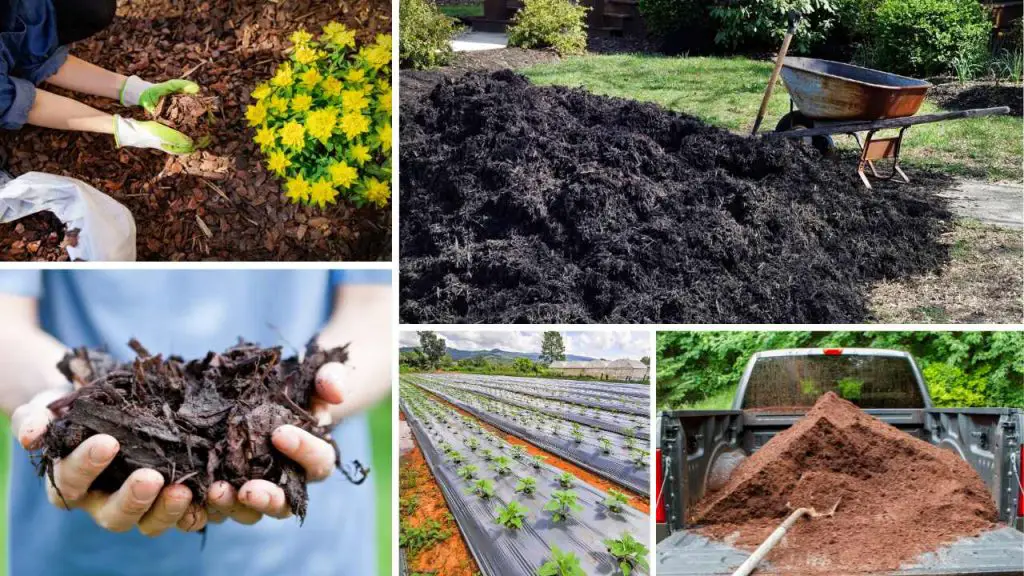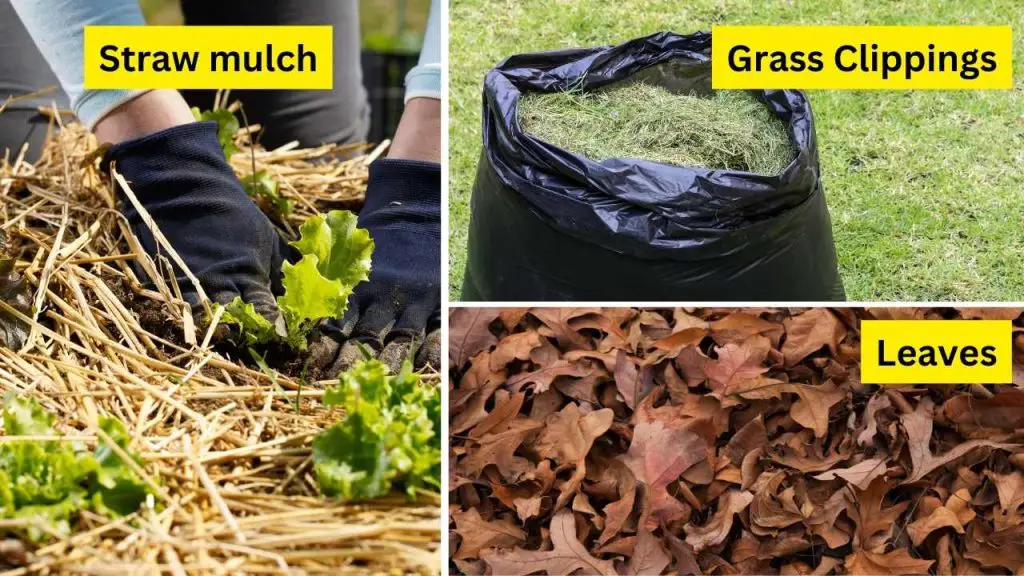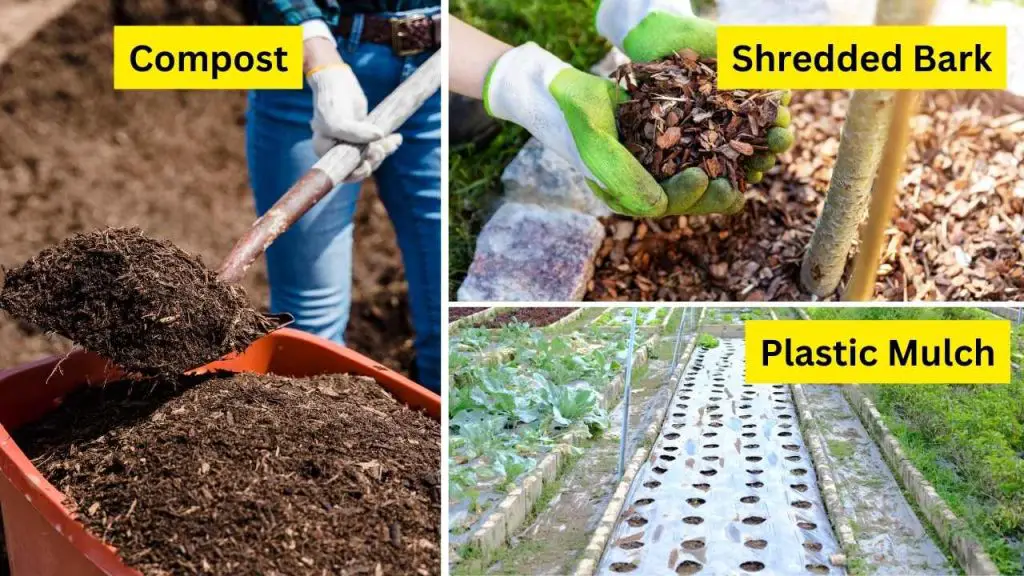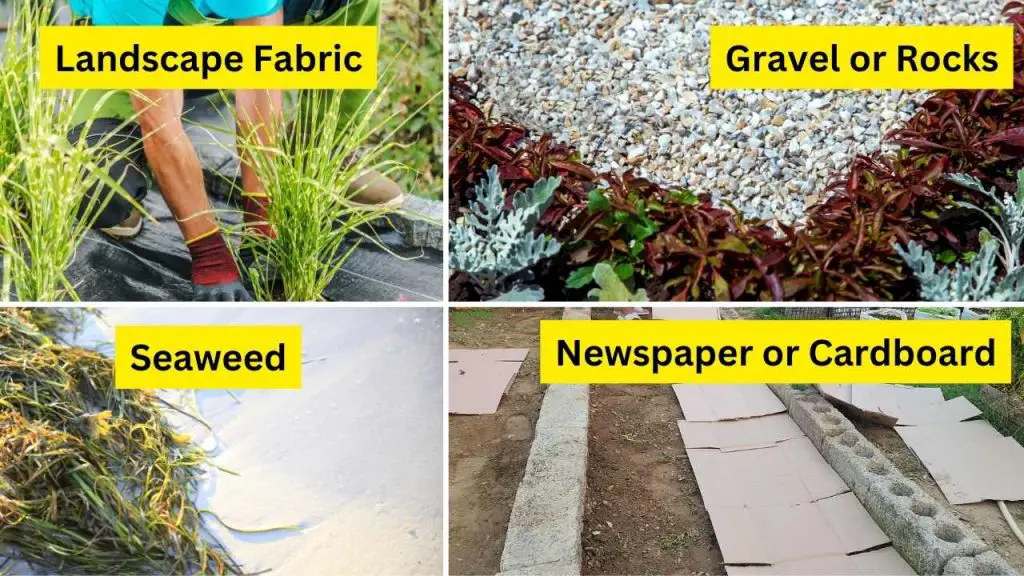Mulch is essential for vegetable gardens because it acts as a protective layer that holds in moisture, controls soil temperature, keeps weeds at bay, and enriches the soil with nutrients and organic matter.

Additionally, it lessens upkeep duties, which increases gardening’s satisfaction and enjoyment. Mulch not only reduces maintenance requirements but also encourages plant growth and productivity.
This article examines the top ten mulch choices for vegetable gardens, evaluating their advantages, disadvantages, and useful uses. These choices include seaweed, plastic mulch, and conventional organic options like compost and straw.
Top 10 Mulch Choices
1- Straw mulch
Straw mulch is a great option for vegetable gardens because of its many advantages and practical application.

By lowering evaporation, straw helps retain soil moisture, which helps vegetable plants receive a steady supply of water—especially in regions with infrequent rainfall or hot, dry spells.
By forming a barrier over the soil and keeping weed seeds from germinating and competing for nutrients, straw mulch effectively suppresses weed growth. Additionally, it protects the soil from erosion and heavy rain, which fosters the best possible growth for vegetables.
By controlling soil temperature, straw mulch fosters healthy plant growth and root development. It gradually adds organic matter, enhancing the fertility and structure of the soil.
Straw is a convenient and sustainable mulch that is reasonably priced and readily available, making it a cost-effective choice for large vegetable gardens.
For vegetable plants, straw mulch is a lightweight, manageable, and straightforward application technique that offers optimal benefits and good coverage.
2- Grass Clippings
For vegetable gardens, grass clippings can be a useful mulch, but there are a few things to keep in mind.
For vegetable plants, grass clippings are a great option because they are a natural fertilizer and nutrient-rich mulch that promotes plant growth and helps to retain soil moisture.
Grass clippings can add organic matter to the soil, control soil temperature, and inhibit the growth of weeds. They reduce the need for manual weeding and help to keep a neat garden bed by stifling weed seeds and blocking sunlight.
Their breakdown improves nutrient availability and soil health.
It is imperative to take certain safety measures when using grass clippings as mulch.
In vegetable gardens, steer clear of mulching grass clippings from lawns treated with chemicals or herbicides. To avoid dense layers and to stop water and air from penetrating, combine grass clippings with organic materials like leaves or straw.
If grass seeds sprout, proceed with caution as they might introduce additional weeds into your garden.
When used sensibly and in conjunction with other organic materials, grass clippings can be a useful mulch for vegetable gardens.
3- Leaves
Vegetable gardens can greatly benefit from the addition of leaf mulch, and these guidelines can help ensure that it is used effectively.
Gather fallen leaves from your yard and stay away from chemicals and pesticides. Using a leaf shredder or lawnmower, chop them into smaller pieces to improve moisture penetration and airflow.
Vegetable plants can benefit from the application of shredded leaves, which should be spread 2 to 4 inches deep to suppress weeds and retain moisture.
It is crucial to leave space around stems to avoid moisture accumulation. In cooler climates, apply in the fall; in warmer climates, apply all year long.
By acting as a natural barrier, leaf mulch inhibits the growth of weeds and minimizes the need for hand weeding.
Additionally, it boosts soil health, holds onto moisture, and adds organic matter to the soil, all of which encourage plant development and the retention of nutrients.
In vegetable gardens, leaves can be used as mulch to improve soil health, keep weeds at bay, retain moisture, and encourage strong plant growth—all while utilizing a sustainable resource.
4- Compost

Using compost as mulch in a vegetable garden is a fantastic idea for several reasons:
Compost introduces organic matter and stimulates microbiological activity, which improves soil structure, aeration, and water retention. By stifling seeds and obstructing sunlight, it inhibits the growth of weeds, promoting the faster growth of vegetable plants.
Additionally, compost keeps soil moisture levels stable, which minimizes the need for watering and shields plants from drought stress.
By insulating the soil’s surface, compost mulch controls soil temperature and encourages healthy growth. It does this by lessening runoff and heavy rain.
By recycling organic waste, compost mulch also helps the environment by lowering the need for chemical pesticides and synthetic fertilizers.
For vegetable gardens, compost mulch is a helpful and eco-friendly option that improves soil health, plant growth, and crop productivity.
5- Shredded Bark
There are benefits and drawbacks to using shredded bark mulch in a vegetable garden.
Mulch made of shredded bark blocks sunlight and stops weed seeds from germinating, thus effectively suppressing weed growth. Additionally, it lessens evaporation, which keeps the soil moist longer and eliminates the need for frequent watering.
It promotes healthy growth by acting as insulation, controlling soil temperature, and providing a stable environment for vegetable roots.
Because it preserves soil structure, stops nutrient loss, and lessens heavy rain and runoff, shredded bark mulch helps to prevent soil erosion. It also gives vegetable gardens a more orderly, organic, and rustic appearance, which improves their aesthetic appeal.
Drawbacks:
Unlike organic mulches like compost or grass clippings, shredded bark mulch does not release nutrients into the soil during its decomposition.
Over time, this can result in nutrient depletion, particularly if they are not regularly replenished. Pine bark mulch is one kind of bark mulch that can acidify the soil, which is good for plants that like acid but bad for vegetable plants.
Since shredded bark mulch breaks down gradually, it must be replenished frequently to keep its ability to suppress weeds and retain moisture.
Benefits of shred bark mulch for vegetable gardens include reduced soil pH and increased nutrient levels; additional organic amendments may be required.
6- Plastic Mulch
There are many advantages to using plastic mulch in vegetable gardens, particularly for warm-season crops like tomatoes, peppers, and cucumbers.
For earlier plant growth and greater yields, use black plastic mulch. Clear weeds from garden beds, even out soil, and make sure the soil is warm and well-watered.
After covering the soil with plastic mulch and securing it with rocks, soil, or staples, make sure that there is room for airflow and heat accumulation.
Vegetable seedlings or seeds can be planted directly into the ground, in plastic mulch, or spaced according to crop spacing. Because plastic mulch evaporative loses water, water and fertilize as needed, modifying watering schedules accordingly. For effective water distribution, think about implementing a drip irrigation system. Fertilize plants based on their individual requirements.
In vegetable gardens, plastic mulch can improve plant growth, lessen weed competition, and preserve water, which will result in healthier plants and larger yields. However, for the sustainability of the environment, it’s imperative to take alternate mulching options into account.
Related Articles:
- Everything You Need To Know About Preparing A Garden Bed For Planting Vegetables
- How To Start Raised Bed Vegetable Gardening For Beginners?
- 8 Fast Growing Vegetables That You Can Grow In A Hurry
7- Landscape Fabric

Compared to compost or shredded bark mulch, landscape fabric is a less popular mulch choice for vegetable gardens, but it still needs to be carefully considered.
By obstructing sunlight and preventing seed germination, landscape fabric effectively suppresses weed growth, minimizing the need for manual weeding and upkeep of vegetable garden beds. Additionally, it holds onto soil moisture, particularly in arid regions.
By acting as insulation, landscape fabric controls the temperature of the soil and encourages healthy growth. By lessening excessive rain and runoff, maintaining soil structure, and halting nutrient loss, it stops soil erosion. Its longevity guarantees moisture retention and weed suppression without the need for replacement.
Vegetable plants are less likely to benefit from landscape fabric because it contributes little in the way of nutrients and can compact the soil. Because it needs to have slits or holes cut in order to accommodate new plantings, it also presents maintenance and planting challenges.
Its longevity may make up for its initial cost, making it a more economical and sustainable mulch for vegetable plants.
Vegetable gardens can benefit from landscape fabric’s ability to keep moisture and suppress weeds, but it’s important to consider the pros and cons, install it properly, and keep an eye on how it affects plant growth and soil health.
8- Gravel or Rocks
In a vegetable garden, using gravel or rocks as mulch has certain advantages over organic options like straw or leaves.
As a physical barrier, gravel or rock mulch inhibits the growth of weeds and minimizes the need for hand weeding. In addition, it provides thermal mass and aids in moisture retention by lowering water evaporation.
Rocks or gravel don’t decompose over time as organic mulches do, but they can help the structure of the soil by reducing erosion and compaction.
To improve heat retention and water penetration, use pea gravel or small river rocks. Clear weeds, debris, and vegetation from garden beds to prepare them.
Make sure the soil is level and that it drains well. Aim for a depth of 1 to 2 inches when installing gravel or rocks around plants to suppress weeds and retain moisture.
Your vegetable garden will look better with gravel or rock mulch, which also makes the landscape low-maintenance. It needs very little upkeep, but for it to work properly, you must periodically check for debris and weed growth.
In vegetable gardens, using gravel or rocks as mulch improves soil protection, moisture retention, and weed suppression; however, drainage, temperature, and long-term soil health must be carefully considered.
9- Newspaper or Cardboard
For vegetable gardens, mulch made of cardboard or newspaper works well as an environmentally friendly way to keep moisture in the soil, suppress weeds, and improve soil health.
For organic gardening, gather used newspapers or cardboard boxes from homes or recycling facilities. Lay them flat and take off the plastic labels, tape, and staples to prepare.
Aim for 2-4 sheets thick when cutting to expedite decomposition and produce a consistent layer of mulch.
To stop weed growth, moisten cardboard or dry newspaper before using it as mulch. Line up the veggies with it directly on the ground, overlapping the edges.
Use organic mulch for nutrient enrichment and anchoring, such as compost, wood chips, or straw. To ensure continued efficacious weed suppression, periodically inspect and replace any damaged areas.
Using cardboard or newspaper mulch in your vegetable garden recycles household materials, improves soil health, and keeps weeds out while also being environmentally friendly.
10- Seaweed
Using seaweed as mulch in a vegetable garden can offer several benefits:
Because seaweed is high in vital nutrients, it can be applied as a mulch to improve soil structure, inhibit the growth of weeds, and release nutrients into the soil.
Because of its organic matter, which increases soil fertility and encourages beneficial microbial activity, vegetable plants can grow naturally without hindrance.
Mulch made from seaweed helps retain soil, lowers evaporation, and requires less frequent watering. It contains salt, which can enhance fertility and soil structure, but too much of it can be dangerous.
Additionally, resistant to pests and diseases, seaweed has been reported by some gardeners to cause fewer issues. By utilizing renewable resources and lowering the need for chemical pesticides and synthetic fertilizers, it’s an environmentally friendly practice.
Seaweed mulch is an important gardening tool that improves soil health, plant growth, and crop productivity; however, it must be harvested responsibly, thoroughly rinsed, and in compliance with local laws.
